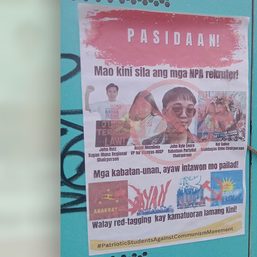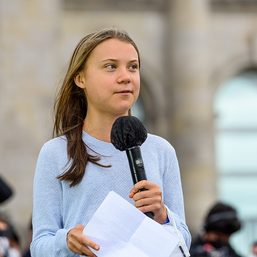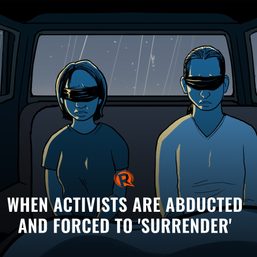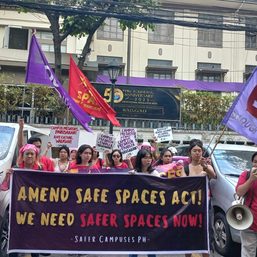SUMMARY
This is AI generated summarization, which may have errors. For context, always refer to the full article.
![[OPINION] Forgetting to remember: For my friend Marielle Domequil](https://www.rappler.com/tachyon/2021/09/forgetting-to-remember-september-14-2021-sq.jpg)
When I was told I had a message from Marielle, I felt a rush of both excitement and anxiety.
It was a voice message. For me. I had not heard from her since her arrest, and with the strict conditions in jails, a recorded voice message was the last thing I was expecting to get from her – if I was expecting at all.
Marielle Domequil, one of my long-time best friends, had been in jail since February 2020. She, along with journalist Frenchie Mae Cumpio, three other activists, and a baby, was arrested in Tacloban on charges of illegal possession of firearms and explosives, in what were simultaneous police raids of supposed “communist terrorist safe houses.”
Save for the few times I had dreamt about her, Marielle and I hadn’t had the chance to speak since.
It was her sister, Kyle, who forwarded the voice message to me.
“Pia…kinakalimutan mo na ‘ko,” her first words went, the muffled recording still ringing with the familiarity of her voice. The last time I heard her speak was in a public video message, recorded from jail, where she thanked everyone who greeted her on her birthday last year.
The last time I heard her speak in person, I could vaguely remember.
Kinakalimutan mo na ‘ko. A feigned smile was all I could muster. She wasn’t posing a question; she was making a statement. A joke, she then disclaimed, but one that wasn’t unfounded – and one that both of us knew was meant to be taken as true.
The first few days since the arrest were certainly the hardest. I could not for a second get my mind off of it, racking my brain for anything of use to Marielle that I could do, calculating if I was doing enough, if I was prying too much, if I was making the right call for every dilemma I was faced with. I tried to explain to our circle, to the best of my ability, the situation that she was in. I urged friends, schoolmates, and whoever else knew her to show solidarity and stand with her. We drafted unity statements, talked about launching petitions and doing everything else we could to support her and clear her name.
But my family was quick to warn me off from openly condemning Marielle’s arrest. So were the parents of my friends – some of whom eventually had to refuse showing vocal support, for fear of being on the radar themselves or being implicated. You see, dealing with an ordeal as perilous as red-tagging would be treading a slippery slope. Make the wrong move, say the wrong word, and you could end up next to have a target on their back.
Fear is contagious. And when it starts to creep in, it spreads rabidly and becomes all the more difficult to control.
And when you can no longer control fear, it starts to control you.
We ended up empty-handed: no unity statements released, no petitions signed. The chilling effect left us shrinking into a corner – grieving in silence, overcome with fear.
It is in these moments, when hope feels a little too out of reach, that conceding to despair becomes an easy choice. When the glimmer of light at the end of the tunnel fades, you find yourself treading a path into unknown. You stop in your tracks. You feel lost in the void, blinded, and with nowhere to go.
By the first month since the arrest, you start to learn how to live with it, the reality that she is not getting out of jail any time soon.
By the first year, you start forgetting to remember.
After listening to Marielle’s voice message, I felt a sharp pang of guilt. It was a somber reminder that would haunt me for days, weeks, even months later.
It left me recounting the memories I had of her.
I remember vividly the day I found out about her arrest, on what was otherwise a typical day in February – exactly a week before Valentine’s Day, and roughly a month before all hell broke loose in this now-pandemic-stricken country. I was in my room, spending my work-from-home Friday like I normally would, when a Facebook post jolted me from my seat.
“ALERT!” The graphic screamed in white text; below it, two photos of two UP alumnae donning their sablays. One of them was Mira Legion, with whom I went to the same grade school and high school. The other was Marielle. They were illegally arrested early that day, the Facebook page said. The post was to demand their immediate release.
I remember seeing their mugshots posted online by She-who-must-not-be-named Blogger. “Study now, NPA later,” the header read in bold letters. It didn’t take long before the post became a meme, shared in university “trashtalkan” groups to strike a supposedly humorous jab at UP students. Their arrest could very well be the worst thing to ever happen to them and their families, yet others deliberately chose to take the cheap shot in the name of levity.
That mugshot was my first sight of Marielle since the news. And she was being dragged through the mud in someone’s shoddy effort to be funny. As if being arrested for a crime she didn’t commit wasn’t already unjust. As if being painted as a terrorist wasn’t already dehumanizing.
I remember attending a relative’s birthday in the province, roughly a week after the arrest. One uncle asked in Waray, in front of other relatives, “‘Di ba kilala mo si Marielle Domequil?” followed with, “Baka NPA ka rin.” They laughed. Marielle’s struggles had been reduced to a family reunion punchline. And I just stood there, frozen – frightened by how brazen they were in throwing around such hasty accusations.
I remember paying a few visits to Marielle’s family when I got back to the province this year, the first time coming home since the pandemic struck, and since that godawful reunion. Once, to bring books to send to her in jail; she had been asking for fiction novels that she could read in her pastime.
The other visit was on a Sunday, and for Marielle’s family, Sunday was a special day: it was the one day in the week that they get to talk to her via a five-minute video call. That day, her family lent us – me and a friend – the five minutes with Marielle. Spotty internet connection aside, several other technical struggles made it difficult to talk to her. One question would take us a sizeable amount of time, as some precious seconds would have to be spent on constantly repeating ourselves so the other could hear more clearly. We were lucky if we got through a few exchanges without her line getting disconnected.
That call made five minutes feel like a second. But for Marielle’s family, those five minutes felt like a week. They’d have to wait again until the next Sunday to be able to see and talk to her.
I remember sitting down with Tita Mayet and Tito Manuel, Marielle’s parents, after we ended the call. They brought up the recent developments on the case, and how Marielle’s arrest affected their family. Tito Manuel talked about Marielle’s situation in jail, how it pained him to see his daughter locked up and deprived of her freedoms, let alone a decent bed to sleep on. Tita Mayet mentioned they’d been noticing a few men roaming their street, circling their block as though they were surveiling their family, tracking their every move.
I remember Tita Mayet telling me, in a hushed tone, something that struck me hard, a perspective that bared a most grim reality.
“Maybe Marielle was better off in jail than out here,” she told me in Waray. “Things could’ve gone worse if she was outside. She could’ve been dead.”
That never occurred to me until that moment. If Marielle was out here, she could’ve been dead. Like Zara Alvarez, who was gunned down and left lifeless on a street in Bacolod. Like Randy Echanis, who was murdered inside his own home in Quezon City. Like the many activists who were killed in cold blood, their stories left untold.
I only get to write about that reality. Marielle lives it.
But once, reality didn’t use to be this harrowing.
I remember the waning days of high school, when coming over to their house meant binge-watching movies, or watching UAAP basketball while finishing up outputs as thesis buddies, or singing to One Direction in her room, or talking about crushes and bonding over shared teenage angst.
I remember fourth grade, when we first came to know each other – I, the new kid from the city, and she, the resident sassy girl. I remember we were always next to each other during flag ceremonies, or for every other time the class had to fall in line. She would lead the girls’ lane as the smallest kid in the pack, and I, the second smallest, would always tail her.
In retrospect, I think it was in our playful bickering while in line that we first grew close to each other.
It is in these moments – and memories – that you ought to want to see beyond despair, even when hope feels a little too out of reach, even when the light at the end of the tunnel seems to fade. You don’t stop in your tracks; you find a reason to hope. I found mine in remembering: from the unspeakable atrocities to the ugliest emotions, the injustices that she had stood against, and those that she had to suffer herself, the appalling remarks by others, the oldest childhood memories.
I write this to remember, and to remember not to forget. – Rappler.com
Add a comment
How does this make you feel?






There are no comments yet. Add your comment to start the conversation.